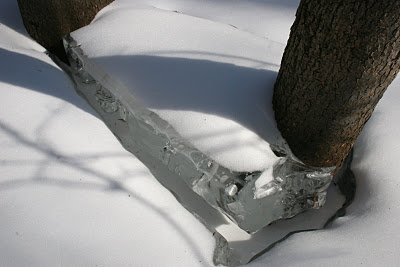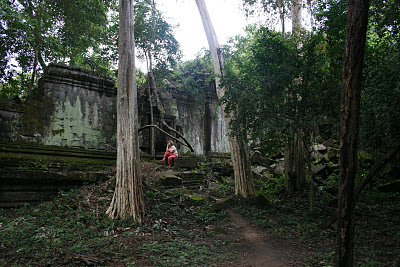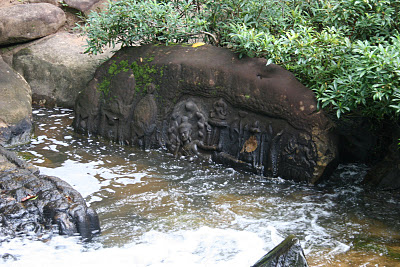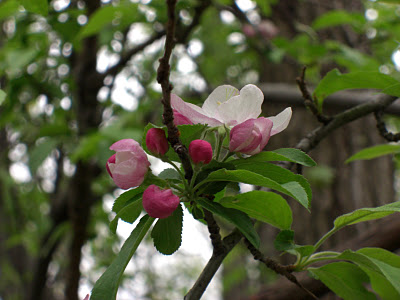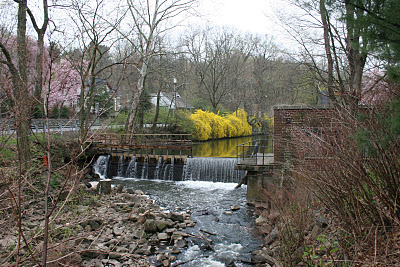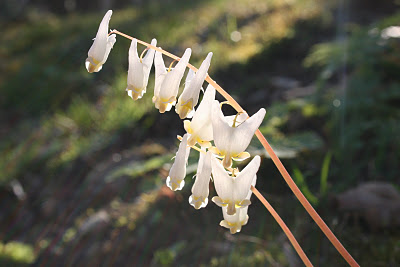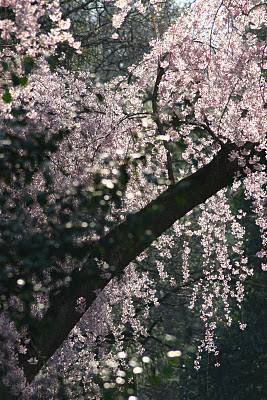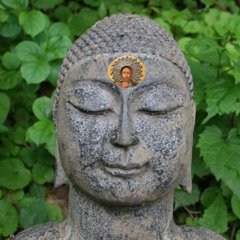
It strikes me that we are forever seeking equilibrium.
I
see that my mind wants things to be quiet and calm, both inside and
outside. It somehow wants everything to reach a state in which not only
all
outer circumstances are under control--the
inner state ought to also be reliable, predictable, and serene.
What I actually want to do is exist in a blissful self-crafted bubble of perfection.
This
idealized view of what my inner and outer states should be like is
comparable to the idea that there is a "balance of nature." That phrase
was used a lot in the beginning of the environmental movement, until
biologists intervened and made it clear that there isn't any "balance"
in nature at all.
Everything in nature is locked in a perpetual
struggle (the classic phrase is "nature, red in tooth and claw.") The
norm is for ecosystems to constantly veer off unpredictably in one
direction or the other. Any impression we get of a steady state is
mistaken.
It's true, there is some evidence that on a global
scale, there are some self-regulating mechanisms that produce a kind of
balance -- for example, the amount of oxygen and carbon dioxide in the
atmosphere have remained relatively constant for extremely long periods
of time. Nonetheless, measured on geologic time scales, this has not
been the same either. There was a time when there was very little
oxygen in the Earth's atmosphere. At that time, it was toxic to life as
we know it today.
Another example is sea levels. Mankind has
treated the coastline for the past several thousand years as though it
were a fixed entity, whereas lessons from geology tell us that the
coastline has moved about a
very
great deal, depending on fluctuating sea levels. There have been times
when the ocean was more than 100 feet deeper than it is today; there
have been other times, during major ice ages, when it was very much
shallower, and the coastlines were miles from where they are now.
10,000 years ago, for example, the ocean was hundreds of feet shallower,
and most coastlines were many miles further out from present
shorelines.
That leads us directly to an obvious and interesting
conclusion: all the major civilizations from that era, which were
surely, like today's, concentrated along river banks and coastlines, are
now deep underwater. When we presume that the earliest civilizations
are the ones we've found and excavated, we exhibit a laughable naïveté.
The very earliest settlements we have found-- for example,
Çatalhöyük in Turkey--were almost certainly small provincial backwaters, well away from the coasts.
All
the major ancient cities are deep underwater, where no one has ever
looked for them. Atlantis never sank below the ocean; the ocean rose up
and engulfed it when the ice melted.
So the equilibrium we
presume on our coastlines as we build today's huge cities is illusory;
given current trends, for example, it's very likely the city of Shanghai
will be
completely underwater in
a few hundred years. This is the real question we are faced with when
we discuss global warming, a question which is so difficult for us to
confront that we would much rather squabble about whether or not it is
even happening, than start planning to deal with the very painful
realities that will arise as a consequence.
How much of our inner
work is affected by a similar belief in an equilibrium that does not
actually exist, and the delusional presumptions it provokes?
I
recall that in the beginning of one of the Movements films, Jeanne
DeSalzmann points out that everything is always in motion. Nothing ever
stays in the same place; it is always moving up or down. If there
is
an equilibrium, it is system-wide and circulatory in nature; that is,
equilibrium is perceptible only on a macroscopic scale, at the universal
level, when all of the bumps and inconsistencies of the fabric of space
and time are "evened out" by an all-encompassing understanding.
In
the meantime, here on our level, our efforts to fix things at points in
time and space amount to naught. This isn't just true of the external
physical circumstances we attempt to control; it's equally true of our
inner states.
I see this frequently in myself. In an effort to
correct my partiality and bring the parts into a greater state of
relationship, there is a presumption in me, if I reach a state where
several parts or centers are more "balanced" in relationship to each
other, that this can somehow be
maintained.
It
never actually works out that way, however; in the end, any equilibrium
attained is fugitive. Almost the moment it establishes itself, it must
inevitably move on to the next stage, whatever that may be. If I try
to hold it in place, I damage it. The only way for me to participate in
its life, in
this life, is to
move forward with it. It's not unusual for me to try to hold onto
something only to discover that it has moved forward several steps past
where I am. And perhaps this may be one of the lessons that Gurdjieff's
movements try to teach us.
The difficulty is that every
perception of equilibrium automatically invites what is perceived to
become a fixed substance; I want to hold it there. The state, what ever
it is, is satisfying, and I want to own it, to keep it, preserve it,
and to have it at my disposal. I have "arrived" at something, and I
would just as soon sit there with it. It is a lot safer than whatever
may come next.
And that's the crux of the matter. I don't know
what will come next. In order to progress within the context of the
energies that flow within me and outside of me, I constantly have to be
willing to take that next step into the unknown. I don't like doing
that. Whether the known is blissful, or comfortable, or satisfying, or
even just plain-old-pedestrian
predictable, it is what I prefer.
Once again we come back to this question that we have investigated so many times over the past months, this question of
faith.
We have to be willing to trust in the process of movement, and apply
our faith-- which is a form of trust -- to the point where the next step
has to be taken.
I, like everyone else, am consistently filled with a wide variety of fears. This makes it difficult for me to take that step.
All
of this reminds me of the moment many years ago when I finally admitted
to myself that I was an alcoholic, and that something needed to be done
about it. I had to take a terrifying step into the unknown, into
Alcoholics Anonymous.
Once I took that step, I was asked to trust the process. To just show up, and trust the process.
In
alcoholism, nothing is theoretical. Life and death are immediate
issues, and the choices are our own to make, not ones made by
authorities, politicians, or enemies. Confronting this disease takes us
to a place where we have to stand naked in front of ourselves. There is
no allegory; there's nothing beautiful here to romanticize about.
If
you want to see group work conducted in a real-life situation,
Alcoholics Anonymous may be as good a place as any Gurdjieff Foundation.
The people in AA aren't safely playing roles in a pink-cloud game of
spirituality. They are dirty, shuffling, irreverent herds of struggling
animals, desperately trying to find their way in a nightmarish
environment where they woke up one day to discover that the enemy is
themself.In a word, they are human beings.
What
we call "real life" is a form of alcoholism. We meet what we call
"real life" and chug-a-lug it down by the gallon full, staggering
chaotically from one event to another, spending money, swilling food,
spewing sex. In front of us we always carry the invincible shield of
denial, and a carefree will to crush the obstructions in our path.
The ego
is an alcoholic. It doesn't need booze to keep it stoked. It is, by its nature, self-stoking.
If
we saw ourselves more from this perspective, as ego-drunkards
staggering through life like fools, we might smack ourselves in the face
and try to sober up. Indeed, I think awakening consists a bit of this.
If we really see ourselves, we may be reminded of the famous statement
Orage made: "when I first saw Orage, I realized that hanging was too
good for him."
It's a well known fact in AA; alcoholics drink to
try and establish equilibrium: a good drunk. It's the holy grail of the
disease. So in adopting the allegory, we can be suspicious of the
practice.
There is no equilibrium. Don't wish for it.
May your roots find water, and your leaves know sun.

